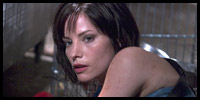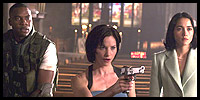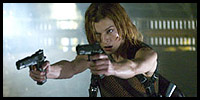
 |
|
Resident Evil: Apocalypse (2004) Cast: Milla Jovovich, Sienna Guillory, Oded Fehr, Thomas Kretschmann, Jared Harris, Mike Epps, Sophie Vavasseur, Raz Adoti, Sandrine Holt, Matthew G. Taylor, Zack Ward, Iain Glen, Dave Nichols 2004 – 95 minutes Rated: Reviewed by Dustin Putman, September 9, 2004.  Zombie movies have recently been making a comeback to mainstream cinema in a big way, and the memories of 2003's "28 Days Later," 2004's "Dawn of the Dead" remake, and 2004's "Shaun of the Dead" work wonders in putting to shame the slipshod effort that is "Resident Evil: Apocalypse," a sequel to 2002's equally ruinous "Resident Evil." Those aforementioned pictures—even the very comedic "Shaun of the Dead"—treated its horrific subject of the living dead with an uncompromising attitude and serious faithfulness to the genre. As for "Dawn of the Dead," which surpassed even the loftiest of expectations to become superior to the classic 1979 original, it stands as the new watermark for all impending zombie features—bloody, unsettling, smart, pitch-black, horrifying, and dramatically sound.
Zombie movies have recently been making a comeback to mainstream cinema in a big way, and the memories of 2003's "28 Days Later," 2004's "Dawn of the Dead" remake, and 2004's "Shaun of the Dead" work wonders in putting to shame the slipshod effort that is "Resident Evil: Apocalypse," a sequel to 2002's equally ruinous "Resident Evil." Those aforementioned pictures—even the very comedic "Shaun of the Dead"—treated its horrific subject of the living dead with an uncompromising attitude and serious faithfulness to the genre. As for "Dawn of the Dead," which surpassed even the loftiest of expectations to become superior to the classic 1979 original, it stands as the new watermark for all impending zombie features—bloody, unsettling, smart, pitch-black, horrifying, and dramatically sound.
 Comparing the opening sequences of the new "Dawn of the Dead" and "Resident Evil: Apocalypse," both of which portray a quiet suburban neighborhood suddenly collapsing in the wake of the undead rising, the drastic differences in quality shine through with startling immediacy. The former fondly knows what type of film it is, transcending the norm with style, originality, a go-for-broke attitude, and much-needed humanity, while tapping into the fear of its unthinkable situation. The latter is creatively bankrupt trash made by a committee of hacks—namely, first-time director Alexander Witt and screenwriter Paul W.S. Anderson (director of the original and also responsible for the failure that is "Alien vs. Predator")—who don't know the first thing about generating suspense, frights, cohesive storytelling, and a reason to care. They also have failed to correct any of the countless mistakes made in the original.
Comparing the opening sequences of the new "Dawn of the Dead" and "Resident Evil: Apocalypse," both of which portray a quiet suburban neighborhood suddenly collapsing in the wake of the undead rising, the drastic differences in quality shine through with startling immediacy. The former fondly knows what type of film it is, transcending the norm with style, originality, a go-for-broke attitude, and much-needed humanity, while tapping into the fear of its unthinkable situation. The latter is creatively bankrupt trash made by a committee of hacks—namely, first-time director Alexander Witt and screenwriter Paul W.S. Anderson (director of the original and also responsible for the failure that is "Alien vs. Predator")—who don't know the first thing about generating suspense, frights, cohesive storytelling, and a reason to care. They also have failed to correct any of the countless mistakes made in the original.
 Opening where the predecessor left off, Alice (Milla Jovovich) awakens in a deserted laboratory to discover a newfound strength and her town of Raccoon City taken over by virus-infested zombies. With the remaining living humans stranded within the city limits and a bomb aimed to wipe everything out at dawn, Alice teams up with tough-as-nails cop Jill Valentine (Sienna Guillory) and a rag-tag group of soldiers and fellow survivors to find an escape route. With the infected (including rotting dogs and other myriad unidentified creatures) coming at them from all angles, an offer arrives from Umbrella Corporation scientist Dr. Ashford (Jared Harris), who will provide them with a helicopter if they can rescue his young daughter, Angela (Sophie Vavasseur), from the school she is holed up in.
Opening where the predecessor left off, Alice (Milla Jovovich) awakens in a deserted laboratory to discover a newfound strength and her town of Raccoon City taken over by virus-infested zombies. With the remaining living humans stranded within the city limits and a bomb aimed to wipe everything out at dawn, Alice teams up with tough-as-nails cop Jill Valentine (Sienna Guillory) and a rag-tag group of soldiers and fellow survivors to find an escape route. With the infected (including rotting dogs and other myriad unidentified creatures) coming at them from all angles, an offer arrives from Umbrella Corporation scientist Dr. Ashford (Jared Harris), who will provide them with a helicopter if they can rescue his young daughter, Angela (Sophie Vavasseur), from the school she is holed up in.
 Based on the Capcom video game series, "Resident Evil: Apocalypse" is a spineless horror film, contemptible toward its core audience of video game fans and zombie flick lovers. It also pitifully wastes its valuable R-rating when so many genre films these days are compromising their vision in exchange for the kid-friendly PG-13 (the most recent cuprits: Anderson's own watered-down "Alien vs. Predator" and "Anacondas: The Hunt for the Blood Orchid"). The MPAA is not to blame this time—they proved with "Dawn of the Dead" that they will now let slide gallons upon gallons of bloodshed and gore without censorship—and so it comes as an even larger discouragement that "Resident Evil: Apocalypse" is rated R more for its harsh language than because of its visceral traits. Alarmingly, the recent series premiere of the "Friends" spin-off, "Joey," literally featured more blood in one scene than this cut-and-dry junk has in all 95 minutes. As for the villains themselves, the zombies have so little screen time and are often so obscured by quick cutting and dark lighting that it is understandable if one occasionally forgets he or she is watching a zombie flick.
Based on the Capcom video game series, "Resident Evil: Apocalypse" is a spineless horror film, contemptible toward its core audience of video game fans and zombie flick lovers. It also pitifully wastes its valuable R-rating when so many genre films these days are compromising their vision in exchange for the kid-friendly PG-13 (the most recent cuprits: Anderson's own watered-down "Alien vs. Predator" and "Anacondas: The Hunt for the Blood Orchid"). The MPAA is not to blame this time—they proved with "Dawn of the Dead" that they will now let slide gallons upon gallons of bloodshed and gore without censorship—and so it comes as an even larger discouragement that "Resident Evil: Apocalypse" is rated R more for its harsh language than because of its visceral traits. Alarmingly, the recent series premiere of the "Friends" spin-off, "Joey," literally featured more blood in one scene than this cut-and-dry junk has in all 95 minutes. As for the villains themselves, the zombies have so little screen time and are often so obscured by quick cutting and dark lighting that it is understandable if one occasionally forgets he or she is watching a zombie flick.
 Many of the movie's faults could be solved if director Alexander Witt knew, or even cared, how to create tension, but he doesn't. In place of a feeling of dread is a numbing swirl of explosions, gunfire, derivative "Matrix"-inspired fights, and incomprehensible action edited by the apparently ADD-prone Eddie Hamilton (2002's "Swept Away"). The plot is nondescript, with Paul W.S. Anderson not even bothering to make sense of what he has written. As for the characters and actors inhabiting the skin-deep roles, none are worth mentioning aside from the unbearable Mike Epps (2003's "The Fighting Temptations"), whose wise-cracking, thoroughly unfunny L.J. is the latest in a current line of despicably stereotypical black characters polluting the horror genre.
Many of the movie's faults could be solved if director Alexander Witt knew, or even cared, how to create tension, but he doesn't. In place of a feeling of dread is a numbing swirl of explosions, gunfire, derivative "Matrix"-inspired fights, and incomprehensible action edited by the apparently ADD-prone Eddie Hamilton (2002's "Swept Away"). The plot is nondescript, with Paul W.S. Anderson not even bothering to make sense of what he has written. As for the characters and actors inhabiting the skin-deep roles, none are worth mentioning aside from the unbearable Mike Epps (2003's "The Fighting Temptations"), whose wise-cracking, thoroughly unfunny L.J. is the latest in a current line of despicably stereotypical black characters polluting the horror genre.
 "Resident Evil: Apocalypse" isn't the torturous experience it could have been to endure, but it is abhorrently clueless, all the same, both on how to stir up the barest of apprehension within the viewer, as well as how to form likable characters and an involving story worth investing in. As impossible as it may seem, "Resident Evil: Apocalypse" might just derive from a lower-common-denominator of zombie-centered filmmaking than 2003's utterly crummy "House of the Dead." Now that is scary.
"Resident Evil: Apocalypse" isn't the torturous experience it could have been to endure, but it is abhorrently clueless, all the same, both on how to stir up the barest of apprehension within the viewer, as well as how to form likable characters and an involving story worth investing in. As impossible as it may seem, "Resident Evil: Apocalypse" might just derive from a lower-common-denominator of zombie-centered filmmaking than 2003's utterly crummy "House of the Dead." Now that is scary.
|
© 2004 by Dustin Putman |














